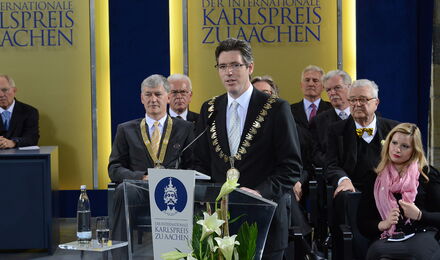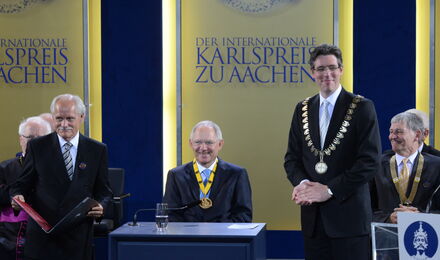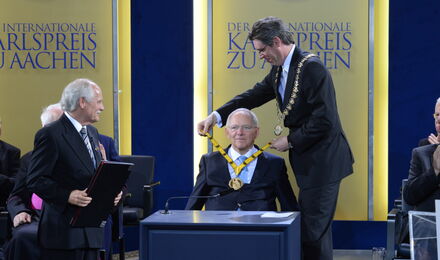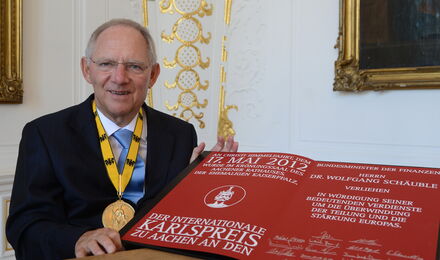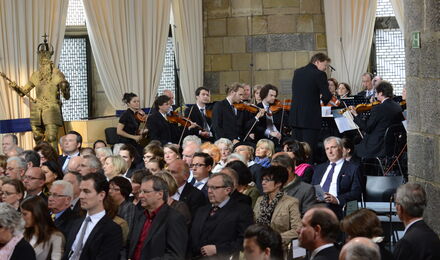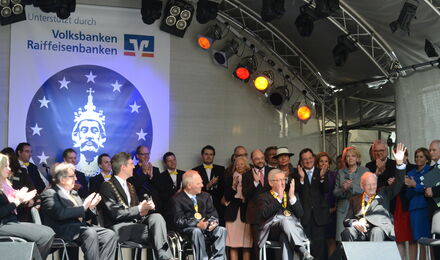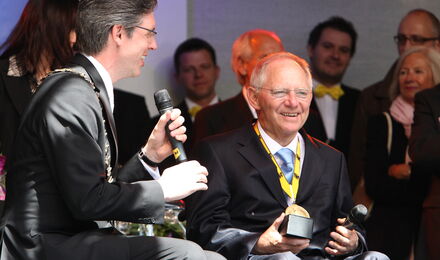In appreciation of his outstanding services in overcoming the division of Germany and Europe and his role as a provider of ideas and a major player in almost all progress towards integration in the past three decades, and in recognition of his significant contributions to the stabilisation of the monetary union and the deepening of the unification process, the Board of Directors of the Society for the Conferring of the International Charlemagne Prize of Aachen honours the Federal Minister of Finance Dr Wolfgang Schäuble
‘Twenty-one years after the peaceful reunification of East and West Germany and after weeks of intensive debates on Europe [...] it is particularly worthwhile to look back once again and to recall the significance of Europe for Germany's second chance [...] The fact that we are able to live in a united Germany as a democratic and liberal constitutional state, surrounded by friendly nations, in prosperity and peace, was unimaginable for most of the generations before us [...] Without our integration into the European Union, the peaceful reunification of Germany would have been infinitely more difficult – if not impossible. We remember the concerns of some of our friends and partners, which could be countered by pointing to Germany's deep roots in a united Europe. We would be ill-advised if we were to believe today that this has become obsolete. Rather, it remains true that the future and success of the reunified Germany are inextricably linked to its integration into European institutions and their targeted further development [...] It has become clear in recent months that the answer to the crisis can only mean more Europe.’
When Wolfgang Schäuble talks about Europe, it is certainly not only fiscal and monetary policy issues that concern the Federal Minister of Finance; much more often, he raises fundamental questions, because Europe is a matter of the heart and inner conviction for him. And when even sharp-tongued critics such as the philosopher Jürgen Habermas see ‘the last prominent European in the cabinet’ in the longest-serving member of the German Bundestag, this also suggests a great deal of respect for the lifetime achievements of the man from Baden.
The euro stands for Europe's will to permanently consolidate and deepen its unity. It stands for the conviction that Europe can only meet the challenges of a globalised world by standing together. Therefore, the future of the euro is inextricably linked to the power of conviction of the idea of European unification. This makes the aid and stabilisation measures that have been gradually implemented since the beginning of 2009 all the more important; but above all, it makes the lessons to be learned from the current crisis all the more important. Europe is at a crossroads – towards political union or towards long-term insignificance! If today's highly nervous financial markets are testing whether and to what extent the European construction of a monetary union can function without a political union with closely coordinated budgetary, financial, economic and social policies, then it is clear that the communitarisation of monetary policy must be followed by further steps, and that in the long term only more Europe promises stability, growth and security.
The consolidation of public finances across the EU, the introduction of the debt brake, the strengthening of sanction rights in the event of non-compliance with the criteria of the single currency – all these are the right steps. But we also need a broad-based debate on deepening European unification, which goes far beyond the debt discussion and the euro. ‘Because the crisis [...] shows, firstly, that European unification is the right answer for the 21st century. Secondly, that we no longer have complete sovereignty, and have not had for a long time, because events in other countries, other markets, other systems directly influence our lives [...] European unification takes into account the fact that the nation state has been unable to fulfil the role it has played since the 17th century since the mid-20th century. What we therefore need in the 21st century is a new form of intergovernmental cooperation.’ The person who said this is one of those who have made a decisive contribution to the development of the European Union over the past 30 years, and he is one of those who today bear significant responsibility for the stability of Europe:
Wolfgang Schäuble was born on 18 September 1942 in Freiburg im Breisgau. After graduating from high school in 1961, he studied law and economics in Freiburg and Hamburg. After passing the first state law examination (1966), a court internship and the second state law examination (1970), he completed his doctorate in 1971 and joined the tax administration of the state of Baden-Württemberg.
In 1972, he was elected to the German Bundestag for the first time, and has been a member ever since, always as a directly elected representative. His election as parliamentary leader of the CDU/CSU faction in 1981 marked the beginning of a long and very intensive collaboration with Helmut Kohl, who appointed him Federal Minister for Special Tasks and Head of the Federal Chancellery two years after the change of government in November 1984.
In April 1989, Schäuble transferred to the Federal Ministry of the Interior, where, in the following year, he was the lead negotiator for the federal government, together with Günther Krause, the then secretary of state for the GDR Prime Minister de Maizière, in charge of the design of the German-German unification treaty. On 31 August 1990, Schäuble and Krause signed the agreement, which ran to several hundred pages. Looking back, Schäuble emphasised: ‘Such a happy development was not necessarily to be expected – given the division of Europe into hostile and militarily armed blocs, and given the bloody violence with which the pursuit of freedom was suppressed in East Berlin on 17 June 1953, in Hungary in 1956, in Czechoslovakia in 1968 and in Poland in 1981. It is only by bearing this scenario in mind that we can truly appreciate the significance of the events of 1989/90: from the Monday demonstrations in the GDR to the implementation of national unity on 3 October 1990. And all of this did not happen in a disorderly fashion, but on the basis of legally watertight laws and treaties and in a dialogue between equals. The decisions taken at the time have proved to be the right ones. The reunited Germany has become normal in the best sense of the word.’
Just a few days after the completion of reunification, Schäuble was seriously injured in an assassination attempt on 12 October 1990 and has been confined to a wheelchair ever since. However, he returned to public life just six weeks later with iron discipline. After the first all-German election, he was initially confirmed in the office of Minister of the Interior, but in November 1991 he took over the chairmanship of the CDU/CSU faction in the Bundestag, which he expanded into the ‘strongest centre of power in the government camp’ (Süddeutsche Zeitung, 28 March 1994) alongside the Chancellery, but above all he also repositioned it conceptually. In September 1994, for example, Schäuble himself (together with the CDU member of parliament Karl Lamers) presented a policy paper containing considerations on European policy that provided impetus that is still reflected today in the debate on the future of Europe. Regarding the further institutional development of the EU, he demanded: ‘The goal must be to strengthen the EU's ability to act and to give it a democratic and federal structure. To achieve this, the fundamental constitutional question – who does what? – in a document similar to a constitution, which clearly defines the competences of the European Union, nation states and regions and defines the Union's ideals [...] All existing institutions, the Council, the Commission, the Presidency and the European Parliament, must be reformed [...] In addition to increasing efficiency, democratisation must be recognised as a guiding principle for all reforms.’ And if Schäuble was already at that time calling for a ‘common, aligned policy’ for the monetary union in the areas of monetary, fiscal, budgetary, economic and social policy, then the EU is now facing this challenge more urgently than ever.
After the loss of the government majority in autumn 1998, Schäuble took over the chairmanship of the federal CDU in November of the same year, in addition to his role as parliamentary party leader. In the wake of the donations scandal that came to light at the end of 1999, he announced his resignation from both offices in February 2000 in order to ‘initiate and enable a fresh start’. In addition to his mandate in the Bundestag, he subsequently concentrated primarily on his work as head of a working group on the distribution of competences between the EU and its member states, in which he primarily advocated more EU powers in foreign, security and defence policy.
In October 2002, he rejoined the CDU/CSU parliamentary group's executive board as Angela Merkel's deputy. When he was reappointed Federal Minister of the Interior in the grand coalition in 2005, he finally returned to the forefront of federal politics and, with the establishment of the Islam Conference, sent a widely noted signal of integration and intercultural dialogue. Four years later, the Chancellor appointed her predecessor in the office of party leader as Federal Finance Minister.
Wolfgang Schäuble is one of the few still active politicians at both the national and European level who have been involved in decisive progress towards integration since the 1980s, including the Single European Act in 1986, which led to the single market, the Unification Treaty in 1990, which ended the division of Germany and Europe, the Maastricht Treaty in 1992, created the Monetary Union and the European Union replaced the European Communities, 1996 the Stability and Growth Pact, 1997 the Treaty of Amsterdam and the Lisbon Treaty of 2007. As a member of the government and as chairman of the majority faction in the Bundestag, Schäuble has accompanied all these steps in a responsible position and in some cases played a decisive role in shaping them.
It was therefore hardly surprising that in 2009 the Chancellor entrusted the most experienced Union politician with the leadership of the Ministry of Finance, the key function for stabilising the common currency. All measures agreed since then have been co-signed by Schäuble, for example, at the national level, the ban on naked short selling and the Bank Restructuring Act, and at the European level, the Greek bailout, the reform of the Stability and Growth Pact, the Euro Plus Pact (‘debt brake’ among other things), the European ‘rescue fund’ (ESFS/EFSM), the recapitalisation of banks and the European Stabilisation Mechanism (ESM).
Beyond the various individual crisis prevention and relief measures, Schäuble has long advocated the introduction and implementation of structural and institutional reforms: ‘We are building a new institutional architecture for the eurozone that means more Europe and more stability [...] So far, the eurozone has only a common monetary policy and no fiscal policy. That is the problem, and we have to change that step by step. We have to become more binding and enforceable at the European level.’
Schäuble, who has always been rooted in the border area between Baden and Alsace, sees Germany and France as having a special responsibility: ‘It is in the existential interest of the Germans that European unification succeeds. What is good for Europe is good for Germany. Europe cannot be built on the principle of hegemony [...] However, we, as the largest member state, are regularly expected to take on a leading role in close cooperation with France. Because only when Germany and France pull together can difficult questions be resolved.’
To this end, he believes that Europe must ‘continue to be willing to move, to reform itself institutionally, to speak with one voice [...] I am convinced that the answer to global challenges is more Europe’. ‘People often ask: What does that mean for young people? My answer to the question of what all this means for young people is clear to me, at least: without a successful Europe that faces up to its responsibilities in this world full of exciting changes, full of great challenges, but also full of fascinating opportunities, our chances in this world are slim. A successful Europe is the best provision we can make for a good future.’
With Federal Finance Minister Dr. Wolfgang Schäuble, the Board of Directors of the Society for the Conferring of the International Charlemagne Prize of Aachen honours in the year 2012 a great European who has rendered historic services in overcoming the division of Germany and Europe, who has been involved in all the important advances in integration in the past three decades and who, especially in times of crisis, is an important driving force in advancing unification towards a political union.





